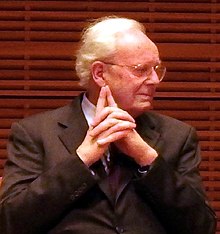Walter LaFeber | |
|---|---|
 LaFeber in 2016 | |
| Born | August 30, 1933 Walkerton, Indiana, U.S. |
| Died | March 9, 2021 (aged 87) Ithaca, New York, U.S. |
| Nationality | American |
| Occupation | Professor of History |
| Spouse | Sandra Gould |
| Children | 2 |
| Awards |
|
| Academic background | |
| Education | Hanover College (BA) Stanford University (MA) University of Wisconsin (PhD) |
| Thesis | The Latin American Policy of the Second Cleveland Administration (1959) |
| Doctoral advisor | Fred Harvey Harrington |
| Academic work | |
| Era | 1950s–2000s |
| Discipline | Historian |
| Sub-discipline | American Foreign Policy |
| Institutions | Cornell University |
| Notable students | |
| Notable works | The New Empire: An Interpretation of American Expansion, 1860–1898 America, Russia and the Cold War, 1945–2006 The Panama Canal: The Crisis in Historical Perspective The Clash: U.S.-Japanese Relations Throughout History |
| Notable ideas | Economics- and markets-based interpretations Effect of revolutions abroad on American decisions Effect of individuals on American policy |
Walter Fredrick LaFeber (August 30, 1933 – March 9, 2021) was an American academic who served as the Andrew H. and James S. Tisch Distinguished University Professor in the Department of History at Cornell University. Previous to that he served as the Marie Underhill Noll Professor of History and a Stephen H. Weiss Presidential Fellow at Cornell.
LaFeber was one of the United States' most distinguished scholars of the history of U.S. foreign policy, and a leading member of the "Wisconsin School" of American diplomatic history. He was known for providing widely read revisionist histories of the Cold War with views like William Appleman Williams but more subtle;[1][2] the label "moderate revisionist" has been applied to him.[3]
LaFeber's teaching abilities led to his longstanding undergraduate "History of American Foreign Relations" class at Cornell gaining a reputation as one of the university's best and most popular courses.[4] A number of his students went on to prominent positions in the U.S. government and academia. In 2006 LaFeber gave a farewell lecture before nearly 3,000 colleagues and former students at the Beacon Theatre in New York City.[5]
- ^ Morgan, James G. (2014). Into New Territory: American Historians and the Concept of American Imperialism. Madison: University of Wisconsin Press. p. 6.
- ^ Cite error: The named reference
cafr-fn-81was invoked but never defined (see the help page). - ^ Rotter, Andrew J.; Costigliola, Frank (November 2004). "Walter LaFeber: Scholar, Teacher, Intellectual". Diplomatic History. 28 (5): 625–635. doi:10.1111/j.1467-7709.2004.00444.x. JSTOR 24914818. At p. 633.
- ^ Cite error: The named reference
chron-2006was invoked but never defined (see the help page). - ^ Cite error: The named reference
chron-beaconwas invoked but never defined (see the help page).